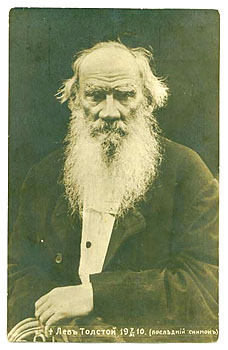So where was Russia at the start of the twentieth century?
An interesting debate over Russia's "progress" before World War I took place in the Slavic Review issues of December 1964 and March 1965: Leopold Haimson, "The Problem of Social Stability in Urban Russia, 1905-1917" (in two parts); Arthur Mendel, "Peasant and Worker on the Eve of the First World War"; Theodore von Laue, "The Chances for Liberal Constitutionalism"; and, Haimson, "Reply." Also in this vein, Hans Rogger, "Russia in 1914," Journal of Contemporary History (October 1966). The optimists argued that conditions were getting better and that it was only World War I which doomed Russia to revolution while the pessimists held that the situation in Russia was not getting better and that revolution was imminent in 1914, postponed only by the outbreak of war.

But real evidence of what ailed Russia in the first decade of the twentieth century could be seen in the last years of Lev Tolstoi, probably Russia's greatest novelist.
As he grew older, Tolstoi became increasingly pre-occupied with his moral concerns (and less concerned with matters relating to his immense wealth, which really irritated his family). In 1901 the Russian Orthodox Church decided that it could no longer deal with his criticisms, and so the church excommunicated him. In 1904, during the Russo-Japanese War, Tolstoi condemned the war, which irritated the Russian government to no end. Finally, in November 1910, Tolstoi took off, abandoning his life, wife, family and wealth, desiring to become a wandering ascetic. A few days later, at age 82, Tolstoy died of pneumonia (20 November 1910), at Astapovo, a remote railway station in Riazan guberniia. Thousands upon thousands of peasants showed up to line the streets for his funeral.
His death, in fact, the death of the moral conscience of Russia, did not bode well for Russia's future.
For a contemporary assessment of the state of Russia's intellectuals, the intelligentsia, have a look at the chapter on "The Intelligentsia" from H.W. Williams' 1915 book, Russia of the Russians.

Some recommended books
- Check some selected resources (both book and web) that we recommend to anyone interested in Russian history and culture.
Some recommended websites
- To follow current events in Russia, check: The St. Petersburg News Net, Nezavisimaia Gazeta (in Russian) or Pravda.
- One of the most important intellectual discussions of Russia's past and future occurred in 1909-10 in the published collection of articles, Vekhi (in Russian). Here is the Russian wiki entry. The collection has also been translated by Marshall Shatz and Judith Zimmerman (1994).
